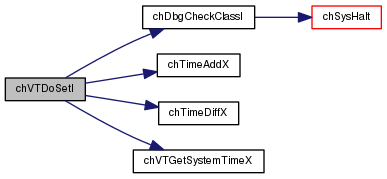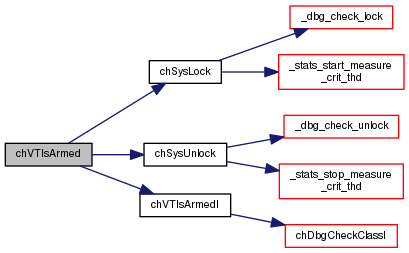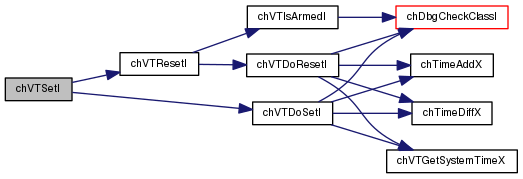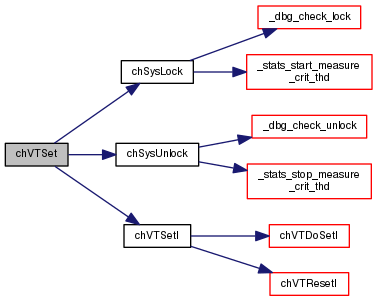
|
Detailed Description
Time and Virtual Timers related APIs and services.
Functions | |
| void | _vt_init (void) |
| Virtual Timers initialization. More... | |
| void | chVTDoSetI (virtual_timer_t *vtp, sysinterval_t delay, vtfunc_t vtfunc, void *par) |
| Enables a virtual timer. More... | |
| void | chVTDoResetI (virtual_timer_t *vtp) |
| Disables a Virtual Timer. More... | |
| static void | chVTObjectInit (virtual_timer_t *vtp) |
Initializes a virtual_timer_t object. More... | |
| static systime_t | chVTGetSystemTimeX (void) |
| Current system time. More... | |
| static systime_t | chVTGetSystemTime (void) |
| Current system time. More... | |
| static sysinterval_t | chVTTimeElapsedSinceX (systime_t start) |
| Returns the elapsed time since the specified start time. More... | |
| static bool | chVTIsSystemTimeWithinX (systime_t start, systime_t end) |
| Checks if the current system time is within the specified time window. More... | |
| static bool | chVTIsSystemTimeWithin (systime_t start, systime_t end) |
| Checks if the current system time is within the specified time window. More... | |
| static bool | chVTGetTimersStateI (sysinterval_t *timep) |
| Returns the time interval until the next timer event. More... | |
| static bool | chVTIsArmedI (const virtual_timer_t *vtp) |
Returns true if the specified timer is armed. More... | |
| static bool | chVTIsArmed (const virtual_timer_t *vtp) |
Returns true if the specified timer is armed. More... | |
| static void | chVTResetI (virtual_timer_t *vtp) |
| Disables a Virtual Timer. More... | |
| static void | chVTReset (virtual_timer_t *vtp) |
| Disables a Virtual Timer. More... | |
| static void | chVTSetI (virtual_timer_t *vtp, sysinterval_t delay, vtfunc_t vtfunc, void *par) |
| Enables a virtual timer. More... | |
| static void | chVTSet (virtual_timer_t *vtp, sysinterval_t delay, vtfunc_t vtfunc, void *par) |
| Enables a virtual timer. More... | |
| static void | chVTDoTickI (void) |
| Virtual timers ticker. More... | |
Function Documentation
| void _vt_init | ( | void | ) |
Virtual Timers initialization.
- Note
- Internal use only.
- Function Class:
- Not an API, this function is for internal use only.
Definition at line 61 of file chvt.c.
References ch, ch_virtual_timers_list::delta, ch_virtual_timers_list::lasttime, ch_virtual_timers_list::next, ch_virtual_timers_list::prev, ch_virtual_timers_list::systime, and ch_system::vtlist.
Referenced by chSysInit().
| void chVTDoSetI | ( | virtual_timer_t * | vtp, |
| sysinterval_t | delay, | ||
| vtfunc_t | vtfunc, | ||
| void * | par | ||
| ) |
Enables a virtual timer.
The timer is enabled and programmed to trigger after the delay specified as parameter.
- Precondition
- The timer must not be already armed before calling this function.
- Note
- The callback function is invoked from interrupt context.
- Parameters
-
[out] vtp the virtual_timer_tstructure pointer[in] delay the number of ticks before the operation timeouts, the special values are handled as follow: - TIME_INFINITE is allowed but interpreted as a normal time specification.
- TIME_IMMEDIATE this value is not allowed.
[in] vtfunc the timer callback function. After invoking the callback the timer is disabled and the structure can be disposed or reused. [in] par a parameter that will be passed to the callback function
- Function Class:
- This is an I-Class API, this function can be invoked from within a system lock zone by both threads and interrupt handlers.
Definition at line 95 of file chvt.c.
References ch, CH_CFG_ST_TIMEDELTA, chDbgAssert, chDbgCheck, chDbgCheckClassI(), chTimeAddX(), chTimeDiffX(), chVTGetSystemTimeX(), ch_virtual_timer::delta, ch_virtual_timers_list::delta, ch_virtual_timer::func, ch_virtual_timers_list::lasttime, ch_virtual_timer::next, ch_virtual_timers_list::next, ch_virtual_timer::par, ch_virtual_timer::prev, ch_virtual_timers_list::prev, TIME_IMMEDIATE, TIME_MAX_SYSTIME, and ch_system::vtlist.
Referenced by chSchGoSleepTimeoutS(), and chVTSetI().

| void chVTDoResetI | ( | virtual_timer_t * | vtp | ) |
Disables a Virtual Timer.
- Precondition
- The timer must be in armed state before calling this function.
- Parameters
-
[in] vtp the virtual_timer_tstructure pointer
- Function Class:
- This is an I-Class API, this function can be invoked from within a system lock zone by both threads and interrupt handlers.
Definition at line 211 of file chvt.c.
References ch, CH_CFG_ST_TIMEDELTA, chDbgAssert, chDbgCheck, chDbgCheckClassI(), chTimeAddX(), chTimeDiffX(), chVTGetSystemTimeX(), ch_virtual_timer::delta, ch_virtual_timers_list::delta, ch_virtual_timer::func, ch_virtual_timers_list::lasttime, ch_virtual_timer::next, ch_virtual_timers_list::next, ch_virtual_timer::prev, TIME_MAX_SYSTIME, and ch_system::vtlist.
Referenced by chSchGoSleepTimeoutS(), and chVTResetI().

|
inlinestatic |
Initializes a virtual_timer_t object.
- Note
- Initializing a timer object is not strictly required because the function
chVTSetI()initializes the object too. This function is only useful if you need to perform achVTIsArmed()check before callingchVTSetI().
- Parameters
-
[out] vtp the virtual_timer_tstructure pointer
- Function Class:
- Initializer, this function just initializes an object and can be invoked before the kernel is initialized.
Definition at line 97 of file chvt.h.
References ch_virtual_timer::func.
|
inlinestatic |
Current system time.
Returns the number of system ticks since the chSysInit() invocation.
- Note
- The counter can reach its maximum and then restart from zero.
-
This function can be called from any context but its atomicity is not guaranteed on architectures whose word size is less than
systime_tsize.
- Returns
- The system time in ticks.
- Function Class:
- This is an X-Class API, this function can be invoked from any context.
Definition at line 115 of file chvt.h.
References ch, ch_virtual_timers_list::systime, and ch_system::vtlist.
Referenced by chThdSleepUntil(), chThdSleepUntilWindowed(), chVTDoResetI(), chVTDoSetI(), chVTDoTickI(), chVTGetSystemTime(), chVTGetTimersStateI(), chVTIsSystemTimeWithinX(), chVTTimeElapsedSinceX(), and trace_next().
|
inlinestatic |
Current system time.
Returns the number of system ticks since the chSysInit() invocation.
- Note
- The counter can reach its maximum and then restart from zero.
- Returns
- The system time in ticks.
- Function Class:
- Normal API, this function can be invoked by regular system threads but not from within a lock zone.
Definition at line 134 of file chvt.h.
References chSysLock(), chSysUnlock(), and chVTGetSystemTimeX().
Referenced by chVTIsSystemTimeWithin().

|
inlinestatic |
Returns the elapsed time since the specified start time.
- Parameters
-
[in] start start time
- Returns
- The elapsed time.
- Function Class:
- This is an X-Class API, this function can be invoked from any context.
Definition at line 152 of file chvt.h.
References chTimeDiffX(), and chVTGetSystemTimeX().

Checks if the current system time is within the specified time window.
- Note
- When start==end then the function returns always true because the whole time range is specified.
- Parameters
-
[in] start the start of the time window (inclusive) [in] end the end of the time window (non inclusive)
- Return values
-
true current time within the specified time window. false current time not within the specified time window.
- Function Class:
- This is an X-Class API, this function can be invoked from any context.
Definition at line 170 of file chvt.h.
References chTimeIsInRangeX(), and chVTGetSystemTimeX().

Checks if the current system time is within the specified time window.
- Note
- When start==end then the function returns always true because the whole time range is specified.
- Parameters
-
[in] start the start of the time window (inclusive) [in] end the end of the time window (non inclusive)
- Return values
-
true current time within the specified time window. false current time not within the specified time window.
- Function Class:
- Normal API, this function can be invoked by regular system threads but not from within a lock zone.
Definition at line 188 of file chvt.h.
References chTimeIsInRangeX(), and chVTGetSystemTime().

|
inlinestatic |
Returns the time interval until the next timer event.
- Note
- The return value is not perfectly accurate and can report values in excess of
CH_CFG_ST_TIMEDELTAticks. - The interval returned by this function is only meaningful if more timers are not added to the list until the returned time.
- Parameters
-
[out] timep pointer to a variable that will contain the time interval until the next timer elapses. This pointer can be NULLif the information is not required.
- Returns
- The time, in ticks, until next time event.
- Return values
-
false if the timers list is empty. true if the timers list contains at least one timer.
- Function Class:
- This is an I-Class API, this function can be invoked from within a system lock zone by both threads and interrupt handlers.
Definition at line 209 of file chvt.h.
References ch, CH_CFG_ST_TIMEDELTA, chDbgCheckClassI(), chTimeDiffX(), chVTGetSystemTimeX(), ch_virtual_timer::delta, ch_virtual_timers_list::lasttime, ch_virtual_timers_list::next, and ch_system::vtlist.

|
inlinestatic |
Returns true if the specified timer is armed.
- Precondition
- The timer must have been initialized using
chVTObjectInit()orchVTDoSetI().
- Parameters
-
[in] vtp the virtual_timer_tstructure pointer
- Returns
- true if the timer is armed.
- Function Class:
- This is an I-Class API, this function can be invoked from within a system lock zone by both threads and interrupt handlers.
Definition at line 239 of file chvt.h.
References chDbgCheckClassI(), and ch_virtual_timer::func.
Referenced by chSchGoSleepTimeoutS(), chVTIsArmed(), and chVTResetI().

|
inlinestatic |
Returns true if the specified timer is armed.
- Precondition
- The timer must have been initialized using
chVTObjectInit()orchVTDoSetI().
- Parameters
-
[in] vtp the virtual_timer_tstructure pointer
- Returns
- true if the timer is armed.
- Function Class:
- Normal API, this function can be invoked by regular system threads but not from within a lock zone.
Definition at line 256 of file chvt.h.
References chSysLock(), chSysUnlock(), and chVTIsArmedI().

|
inlinestatic |
Disables a Virtual Timer.
- Note
- The timer is first checked and disabled only if armed.
- Precondition
- The timer must have been initialized using
chVTObjectInit()orchVTDoSetI().
- Parameters
-
[in] vtp the virtual_timer_tstructure pointer
- Function Class:
- This is an I-Class API, this function can be invoked from within a system lock zone by both threads and interrupt handlers.
Definition at line 276 of file chvt.h.
References chVTDoResetI(), and chVTIsArmedI().
Referenced by chVTReset(), and chVTSetI().

|
inlinestatic |
Disables a Virtual Timer.
- Note
- The timer is first checked and disabled only if armed.
- Precondition
- The timer must have been initialized using
chVTObjectInit()orchVTDoSetI().
- Parameters
-
[in] vtp the virtual_timer_tstructure pointer
- Function Class:
- Normal API, this function can be invoked by regular system threads but not from within a lock zone.
Definition at line 293 of file chvt.h.
References chSysLock(), chSysUnlock(), and chVTResetI().

|
inlinestatic |
Enables a virtual timer.
If the virtual timer was already enabled then it is re-enabled using the new parameters.
- Precondition
- The timer must have been initialized using
chVTObjectInit()orchVTDoSetI().
- Parameters
-
[in] vtp the virtual_timer_tstructure pointer[in] delay the number of ticks before the operation timeouts, the special values are handled as follow: - TIME_INFINITE is allowed but interpreted as a normal time specification.
- TIME_IMMEDIATE this value is not allowed.
[in] vtfunc the timer callback function. After invoking the callback the timer is disabled and the structure can be disposed or reused. [in] par a parameter that will be passed to the callback function
- Function Class:
- This is an I-Class API, this function can be invoked from within a system lock zone by both threads and interrupt handlers.
Definition at line 322 of file chvt.h.
References chVTDoSetI(), and chVTResetI().
Referenced by chVTSet().

|
inlinestatic |
Enables a virtual timer.
If the virtual timer was already enabled then it is re-enabled using the new parameters.
- Precondition
- The timer must have been initialized using
chVTObjectInit()orchVTDoSetI().
- Parameters
-
[in] vtp the virtual_timer_tstructure pointer[in] delay the number of ticks before the operation timeouts, the special values are handled as follow: - TIME_INFINITE is allowed but interpreted as a normal time specification.
- TIME_IMMEDIATE this value is not allowed.
[in] vtfunc the timer callback function. After invoking the callback the timer is disabled and the structure can be disposed or reused. [in] par a parameter that will be passed to the callback function
- Function Class:
- Normal API, this function can be invoked by regular system threads but not from within a lock zone.
Definition at line 351 of file chvt.h.
References chSysLock(), chSysUnlock(), and chVTSetI().

|
inlinestatic |
Virtual timers ticker.
- Note
- The system lock is released before entering the callback and re-acquired immediately after. It is callback's responsibility to acquire the lock if needed. This is done in order to reduce interrupts jitter when many timers are in use.
- Function Class:
- This is an I-Class API, this function can be invoked from within a system lock zone by both threads and interrupt handlers.
Definition at line 368 of file chvt.h.
References ch, CH_CFG_ST_TIMEDELTA, chDbgAssert, chDbgCheckClassI(), chSysLockFromISR(), chSysUnlockFromISR(), chTimeAddX(), chTimeDiffX(), chVTGetSystemTimeX(), ch_virtual_timer::delta, ch_virtual_timer::func, ch_virtual_timers_list::lasttime, ch_virtual_timer::next, ch_virtual_timers_list::next, ch_virtual_timer::par, ch_virtual_timer::prev, ch_virtual_timers_list::systime, TIME_MAX_SYSTIME, and ch_system::vtlist.
Referenced by chSysTimerHandlerI().

